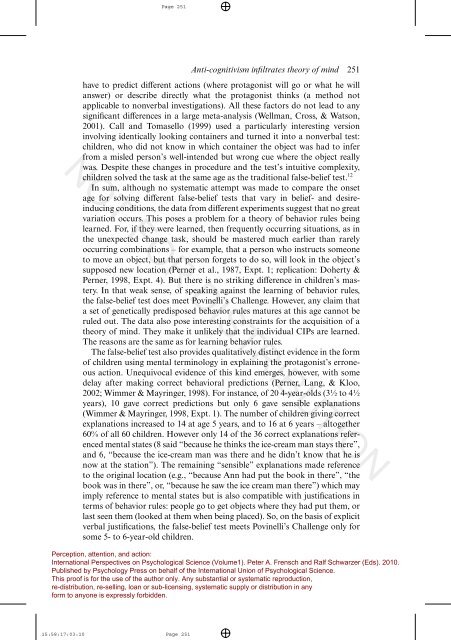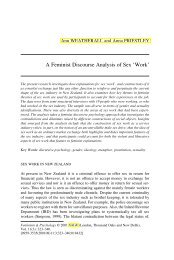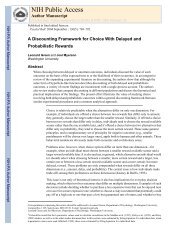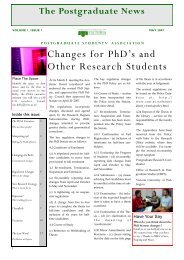Perner 2010.pdf
Perner 2010.pdf
Perner 2010.pdf
You also want an ePaper? Increase the reach of your titles
YUMPU automatically turns print PDFs into web optimized ePapers that Google loves.
Page 251Anti-cognitivism infiltrates theory of mind 251have to predict different actions (where protagonist will go or what he willanswer) or describe directly what the protagonist thinks (a method notapplicable to nonverbal investigations). All these factors do not lead to anysignificant differences in a large meta-analysis (Wellman, Cross, & Watson,2001). Call and Tomasello (1999) used a particularly interesting versioninvolving identically looking containers and turned it into a nonverbal test:children, who did not know in which container the object was had to inferfrom a misled person’s well-intended but wrong cue where the object reallywas. Despite these changes in procedure and the test’s intuitive complexity,children solved the task at the same age as the traditional false-belief test. 12In sum, although no systematic attempt was made to compare the onsetage for solving different false-belief tests that vary in belief- and desireinducingconditions, the data from different experiments suggest that no greatvariation occurs. This poses a problem for a theory of behavior rules beinglearned. For, if they were learned, then frequently occurring situations, as inthe unexpected change task, should be mastered much earlier than rarelyoccurring combinations – for example, that a person who instructs someoneto move an object, but that person forgets to do so, will look in the object’ssupposed new location (<strong>Perner</strong> et al., 1987, Expt. 1; replication: Doherty &<strong>Perner</strong>, 1998, Expt. 4). But there is no striking difference in children’s mastery.In that weak sense, of speaking against the learning of behavior rules,the false-belief test does meet Povinelli’s Challenge. However, any claim thata set of genetically predisposed behavior rules matures at this age cannot beruled out. The data also pose interesting constraints for the acquisition of atheory of mind. They make it unlikely that the individual CIPs are learned.The reasons are the same as for learning behavior rules.The false-belief test also provides qualitatively distinct evidence in the formof children using mental terminology in explaining the protagonist’s erroneousaction. Unequivocal evidence of this kind emerges, however, with somedelay after making correct behavioral predictions (<strong>Perner</strong>, Lang, & Kloo,2002; Wimmer & Mayringer, 1998). For instance, of 20 4-year-olds (3½ to 4½years), 10 gave correct predictions but only 6 gave sensible explanations(Wimmer & Mayringer, 1998, Expt. 1). The number of children giving correctexplanations increased to 14 at age 5 years, and to 16 at 6 years – altogether60% of all 60 children. However only 14 of the 36 correct explanations referencedmental states (8 said “because he thinks the ice-cream man stays there”,and 6, “because the ice-cream man was there and he didn’t know that he isnow at the station”). The remaining “sensible” explanations made referenceto the original location (e.g., “because Ann had put the book in there”, “thebook was in there”, or, “because he saw the ice cream man there”) which mayimply reference to mental states but is also compatible with justifications interms of behavior rules: people go to get objects where they had put them, orlast seen them (looked at them when being placed). So, on the basis of explicitverbal justifications, the false-belief test meets Povinelli’s Challenge only forsome 5- to 6-year-old children.NOT FOR DISTRIBUTIONPerception, attention, and action:International Perspectives on Psychological Science (Volume1). Peter A. Frensch and Ralf Schwarzer (Eds). 2010.Published by Psychology Press on behalf of the International Union of Psychological Science.This proof is for the use of the author only. Any substantial or systematic reproduction,re-distribution, re-selling, loan or sub-licensing, systematic supply or distribution in anyform to anyone is expressly forbidden.15:58:17:03:10Page 251






